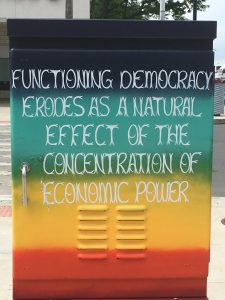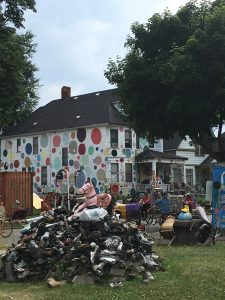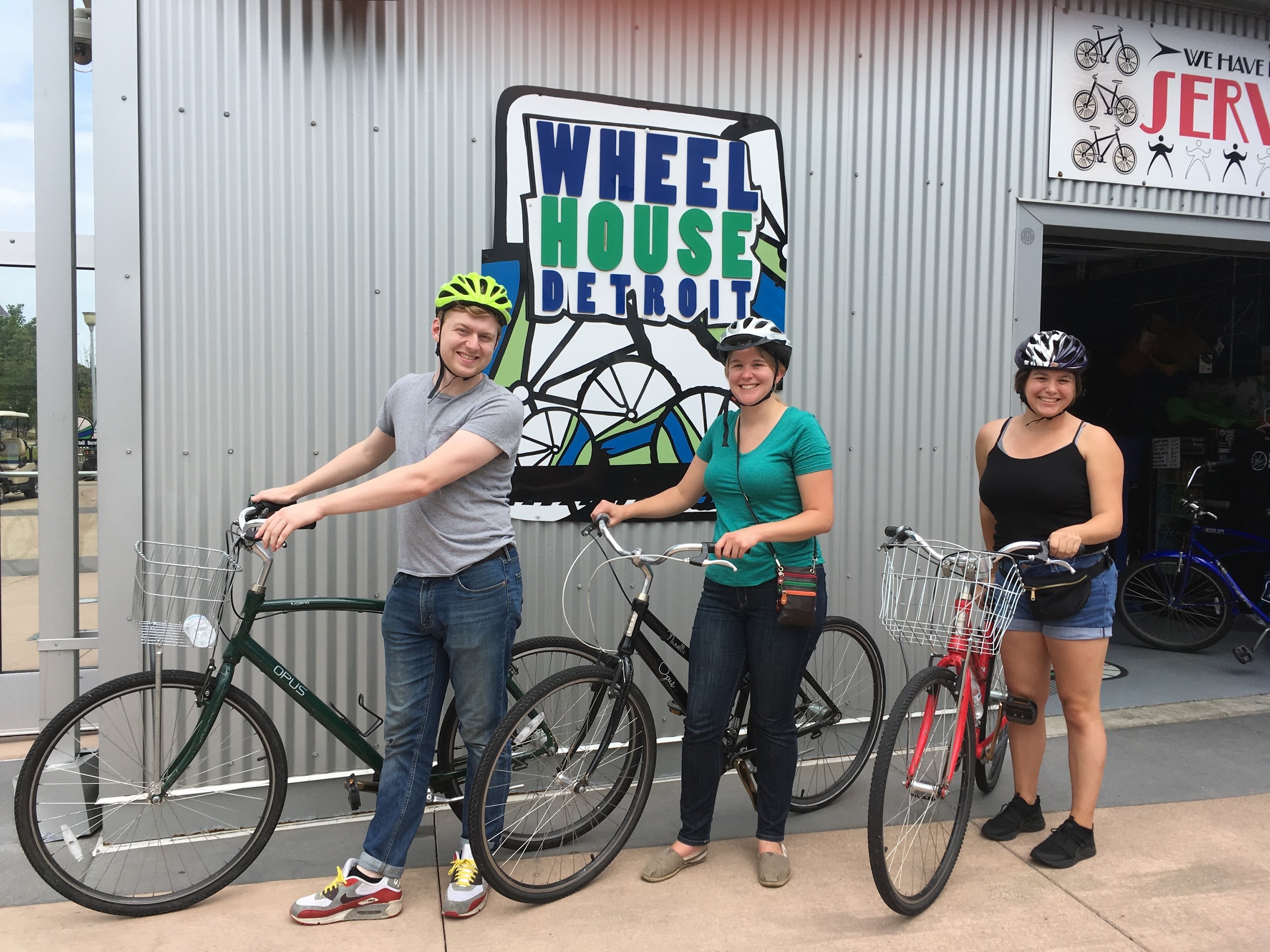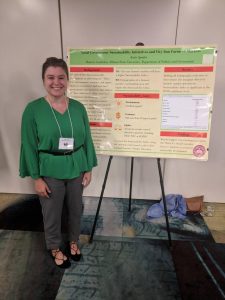In July, three Stevenson Center Fellows attended the annual Community Development Society (CDS) conference in Detroit. The conference brings together academics and practitioners for three days of sessions, discussions, and workshops that integrate research and application.

A painted electrical box in Detroit’s Eastern Market, a hub for local food businesses. Eastern Market is home to one of the oldest and largest year-round markets in the United States.
Support from the Hunt Family Fund and the Alice Ebel Monthly Scholarship enabled Kate Brunk, Jerome Sader, and Katie Spoden to participate in the conference and network with other community developers. Additionally, Spoden was selected to present her research on farmers markets as tools for community development.
The Hunt Family Fund supports educational activities relating to civil society, social entrepreneurship, institution building, and community development. Bob Hunt is emeritus faculty in the Politics and Government Department and founder of the university’s Peace Corps Fellows Program. Alice Ebel, the first chair of the department and the first woman elected to the McLean County Board, established a scholarship for women pursuing careers in public service.
All three students are AmeriCorps alums and in the second year of the Applied Community and Economic Development Fellows Program through the Stevenson Center. Because they started their year-long professional practice over the summer, the CDS conference offered a valuable opportunity to reflect on their past year of academic coursework and to prepare for work with their various host organizations.
Brunk, a graduate student in the Politics and Government Department, is serving with the East Central Illinois Area Agency on Aging (ECIAAA) in Bloomington. She is planning and implementing interventions to reduce social isolation across the agency’s sixteen-county service area.
“A presentation about rural transportation at the conference helped me better understand the different public, private, and nonprofit actors who must collaborate to make public transportation accessible and useful to residents in rural areas,” Brunk said. “Because all of ECIAAA’s counties are considered rural or have rural areas in them, access to reliable and affordable transportation is a key factor in meeting the needs and promoting the well-being of older adults. Learning about the challenges and being able to talk directly with the researchers about their research design, results, and partnerships with practitioners, has enabled me to apply the lessons they’ve learned to the context in central Illinois.”

A scene from The Heidelberg Project. The project is run by a Detroit-based community organization with the mission to improve the lives of people and neighborhoods through art.
Sader, a graduate student in the Economics Department, is with the policy advocacy team at Housing Action Illinois. Sader is supporting the organization’s efforts in lobbying, voter registration outreach, and coalition building.
“The CDS conference was an important experience for me to learn about rural issues,” said Sader, who hails from Chicago. “Urban issues are more familiar to me. However, this year at Housing Action Illinois, it is my duty to support a policy agenda that improves housing affordability across the entire state of Illinois. The presentations on the ways that university extension programs have connected service providers together in rural communities demonstrated to me that there is a lot of coordinating that can be done among the myriad of housing programs that our federal and state governments facilitate.”
Spoden was selected to present her research at a poster session during the CDS conference. “Having the opportunity to share what I have done in the classroom with academics and practitioners provided a great opportunity to receive feedback and hear other perspectives,” said Spoden. Her research focuses on farmers markets and their impact on sustainable community development.
“My favorite part of the conference was the location. Detroit is at the forefront of innovation using agriculture to promote well-being and equity. With my interest in food and agriculture as a tool for community development, this was especially meaningful.” Spoden, a graduate student in the Politics and Government Department, just started her placement with the Alliance to End Homelessness of Suburban Cook County.
With Detroit as the background, the CDS conference provided an opportunity to reflect on the city’s renaissance. Researchers, practitioners, and local organizers shared their diverse experiences overcoming barriers to create their visions of community. The CDS conference enabled the students to build on the interdisciplinary discussions that the Stevenson Center fosters during the first year of coursework.
“I am very thankful that the Stevenson Center and the Department of Politics and Government could support sending three of us to this conference,” stated Brunk. “The critical reflection that we were able to engage in together was one of the most valuable parts of the experience for me because it enabled us to explore from new perspectives the ideas and approaches we’ve discussed over the last year.”
Spoden added, “The Stevenson Center differentiates itself from other graduate programs by facilitating opportunities, such as attending the CDS conference, to allow students to take classroom conversations and apply them.”


